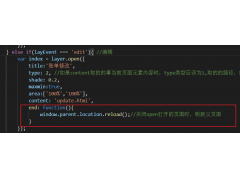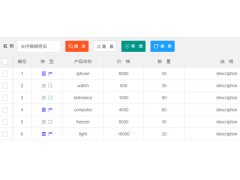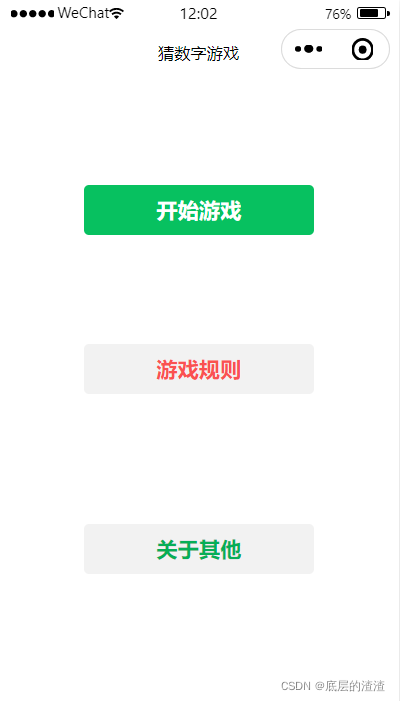AngularJS adding authorization to routes(AngularJS向路由添加授权)
问题描述
如何向 AngularJS 和 ui.router 添加授权?我正在使用 modulg ng-oauth https://github.com/andreareginato/oauth-ng
How can I add authorization to AngularJS and ui.router? I'm using the modulg ng-oauth https://github.com/andreareginato/oauth-ng
我可以使用页面中的以下示例 http://andreareginato.github.io/oauth-ng/?
Can I use the following examples from the page http://andreareginato.github.io/oauth-ng/?
$scope.$on('oauth:login', function(event, token) {
console.log('Authorized third party app with token', token.access_token);
});
$scope.$on('oauth:logout', function(event) {
console.log('The user has signed out');
});
$scope.$on('oauth:loggedOut', function(event) {
console.log('The user is not signed in');
});
$scope.$on('oauth:denied', function(event) {
console.log('The user did not authorize the third party app');
});
$scope.$on('oauth:expired', function(event) {
console.log('The access token is expired. Please refresh.');
});
$scope.$on('oauth:profile', function(profile) {
console.log('User profile data retrieved: ', profile);
});
谢谢,西蒙
推荐答案
你可以像这样创建一些常量角色:
You could create some constant roles like this:
.constant('USER_ROLES', {
ALL: '*', //@unused
ADMIN: 'ROLE_ADMIN';
USER: 'ROLE_USER',
ANONYMOUS: 'ROLE_ANONYMOUS'
})
将此自定义数据/常量添加到您的状态:
Add this custom data/constants to your states:
$stateProvider.state('myapp.admin', {
url: '/admin',
.....
data : {
authorizedRoles : [USER_ROLES.ADMIN] //Thes
}
}
因此,当您对这些角色进行身份验证并从数据库中检索这些角色时,您可以将其存储在您的用户对象和会话中,以便最终在路由更改时进行验证...
So when you authenticate and retrieve these roles from your database you can store this in your user object and session so you can eventually verify this when a route changes...
在您的身份验证服务中(除了登录、注销等),您可以添加以下方法.
In your auth service (apart from logging in, logging out etc...) you add the following methods.
isAuthenticated: function () {
return session.hasSession();
},
isAuthorized: function (authorizedRoles) {
if (!angular.isArray(authorizedRoles)) {
authorizedRoles = [authorizedRoles];
}
var roles = session.roles();
var roleIncluded = roles.some(function (role) {
return (authorizedRoles.indexOf(role) != -1);
});
return (session.hasSession() && roleIncluded);
},
因此,当您更改应用程序中的路由时,.run 会发生块验证,并且可以进行预防.
So when you change the route in the applications .run block validation occurs and prevention is possible.
$rootScope.$on('$stateChangeStart', function (event, next) {
if (authService.isAuthenticated()) {
if (next.data.authorizedRoles === null) {
handle();
}
if (!authService.isAuthorized(next.data.authorizedRoles)) {
handle();
}
} else {
handle();
}
}
当然这只是一个例子,请记住还有其他解决方案.
Ofcourse this is just an example and bear in mind there are other solutions.
这篇关于AngularJS向路由添加授权的文章就介绍到这了,希望我们推荐的答案对大家有所帮助,也希望大家多多支持编程学习网!
本文标题为:AngularJS向路由添加授权


基础教程推荐
- 如何在特定日期之前获取消息? 2022-01-01
- 为什么我在 Vue.js 中得到 ERR_CONNECTION_TIMED_OUT? 2022-01-01
- 每次设置弹出窗口的焦点 2022-01-01
- Javascript 在多个元素上单击事件侦听器并获取目标 2022-01-01
- Node.js 有没有好的索引/搜索引擎? 2022-01-01
- 如何使用sencha Touch2在单页中显示列表和其他标签 2022-01-01
- WatchKit 支持 html 吗?有没有像 UIWebview 这样的控制器? 2022-01-01
- 如何使用 CSS 显示和隐藏 div? 2022-01-01
- jQuery File Upload - 如何识别所有文件何时上传 2022-01-01
- 什么是不使用 jQuery 的经验技术原因? 2022-01-01

















